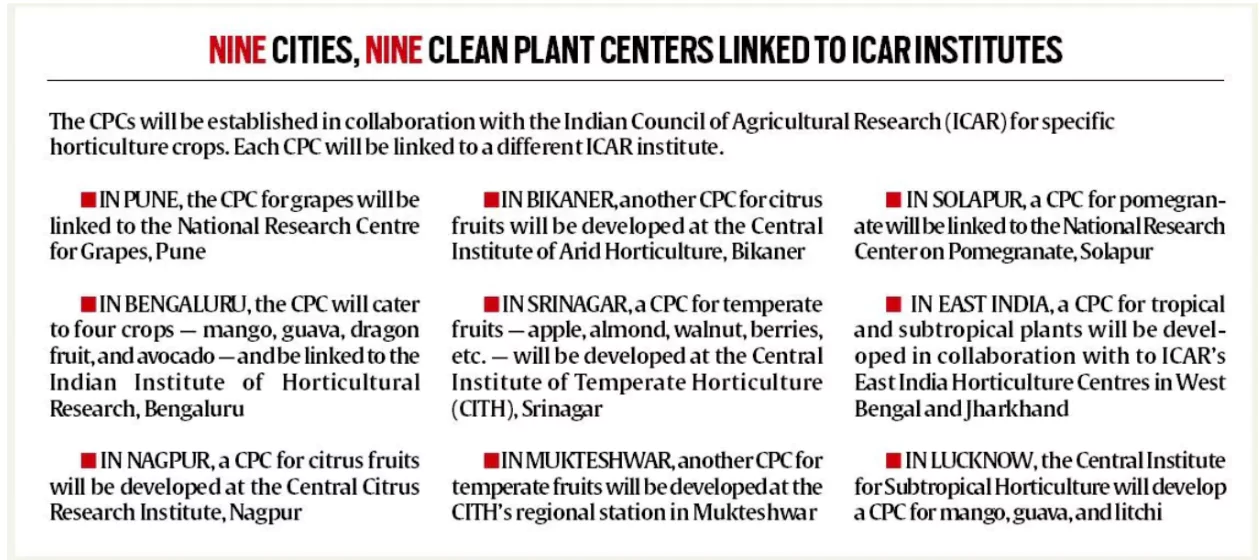Recently the Union Cabinet approved the Clean Plant Programme (CPP) proposed by the Ministry of Agriculture and Farmers Welfare.
- Rs 1,765 crore has been allocated for the programme. One half of this will be sourced from the budget of the Mission for Integrated Development of Horticulture (MIDH), while the other half will be in the form of a loan from the Asian Development Bank (ADB).
About Clean Plant Programme (CPP)
- Objective: To revolutionise the horticulture sector in India and expected to set new standards for excellence and sustainability.
- Initiative by: Ministry of Agriculture and Farmers Welfare
- Implemented By: The programme will be implemented by the National Horticulture Board in collaboration with the Indian Council of Agricultural Research (ICAR).
- Significance: Clean Plant Programme (CPP) is set to significantly boost India’s horticultural sector while aligning with Mission LiFE and the One Health initiatives.
- It will promote sustainable and eco-friendly agricultural practices and reduce dependence on imported planting materials.
- Global exporter: This programme will be a crucial step toward establishing India as a leading global exporter of fruits and driving transformative change across the sector.
Enroll now for UPSC Online Course
Core Components of the Clean Plant Programme
- Clean Plant Centers (CPCs): Nine world class state-of-the-art CPCs, equipped with advanced diagnostic therapeutics and tissue culture labs, will be established across India.
- These centers will play a crucial role in producing and maintaining virus-free planting material meant for larger propagation.

- Certification and Legal Framework: A robust certification system will be implemented, supported by a regulatory framework under the Seeds Act 1966, to ensure thorough accountability and traceability in planting material production and sale.
- Enhanced Infrastructure: Support will be provided to large-scale nurseries for the development of infrastructure, facilitating the efficient multiplication of clean planting material.
What is the need for the Clean Plant Programme?
- Production: India is the second largest producer of fruits and vegetables in the world after China.
- From 2013-14 to 2023-24: Area under horticulture crops has risen from 24 million hectares to 28.63 million hectares, and production has increased from 277.4 million metric tonnes (mt) to 352 million mt.
- Import & Export: India is also a major importer and exporter of fresh fruits.
- In the financial year 2023-24: India exported fresh fruits worth $1.15 billion, while it imported fruits worth $2.73 billion.
- With the rising consumption of fruits in the country, demand has specifically increased for planting materials of foreign apples, and “exotics” such as avocado and blueberry.
- Current Import Process: Process of importing plants is very cumbersome, with imported plants having to be kept in quarantine for two years.
- The CPCs will cut this period down to six months, and thus make it easier for farmers to access disease free and genuine planting material for horticultural crops in India.
Key Benefits of the Clean Plant Programme (CPP)
- Farmers: The CPP will provide access to virus-free, high-quality planting material, leading to increased crop yields and improved income opportunities.
- Nurseries: Streamlined certification processes and infrastructure support will enable nurseries to efficiently propagate clean planting material, fostering growth and sustainability.
- Consumers: The initiative will ensure that consumers benefit from superior produce that is free from viruses, enhancing the taste, appearance, and nutritional value of fruits.
- Exports: By producing higher-quality, disease-free fruits, India will strengthen its position as a leading global exporter, expanding market opportunities and increasing its share in the international fruit trade.
- Affordability: The Programme will prioritize affordable access to clean plant material for all farmers, regardless of their landholding size or socioeconomic status.
- Inclusivity: The Programme will actively engage women farmers in its planning and implementation, ensuring their access to resources, training and decision-making opportunities.
- Diversification: The Programme will address the diverse agro-climatic conditions across India by developing region-specific clean plant varieties and technologies.
Check Out UPSC CSE Books From PW Store
Government Interventions in Indian Horticulture Sector
- Mission for Integrated Development of Horticulture (MIDH):
- It is a centrally sponsored scheme for the holistic growth of the horticulture sector covering fruits, vegetables, root & tuber crops, mushrooms, spices, flowers, aromatic plants, coconut, cashew, cocoa and bamboo.
- Subschemes:
- National Horticulture Mission (NHM)
- Horticulture Mission for North East and Himalayan States (HMNEH)
- National Horticulture Board (NHB)
- Coconut Development Board (CDB)
- Central Institute of Horticulture (CIH), Nagaland.
- CHAMAN (Coordinated Horticulture Assessment and Management using geo-informatics):
- Under this project, sound methodology for estimation of Horticulture crops is being developed and implemented on pilot basis using Sample Survey methodology and Remote Sensing technology.
- Horticulture Area Production Information System (HAPIS): This is a web portal for online submission of district level data pertaining to area and production of horticulture crop.
- National Horticulture Board (NHB): It was set up by the Government of India in 1984 as an Autonomous organization under the administrative control of the Ministry of Agriculture and Farmers Welfare.
- Objectives: To improve integrated development of the Horticulture industry and to help in coordinating, sustaining the production and processing of fruits and vegetables.
- Cluster Development Programme: It aims to promote the integrated and market-led development of pre-production, production, post-harvest, logistics, branding, and marketing activities by leveraging the geographical specialisation of horticulture clusters.
- Pradhan Mantri Krishi Sinchayee Yojana (PMKSY): It is addressing the irrigation problem which aims to promote the development of irrigation infrastructure, expand the cultivable areas, and enhance on-farm water efficiency.
- Agricultural Marketing and Farmer Friendly Reforms Index: It ranks states and union territories based on implementing provisions proposed under the model APMC Act, joining the e-NAM initiative, providing special treatment to fruits and vegetables for marketing, and tax levies in mandis.
- Pradhan Mantri Fasal Bima Yojana (PMFBY): It aims to reduce crop losses which provides comprehensive crop insurance coverage from pre-sowing to post-harvest losses against non-preventable natural risks.
|
![]() 12 Aug 2024
12 Aug 2024

